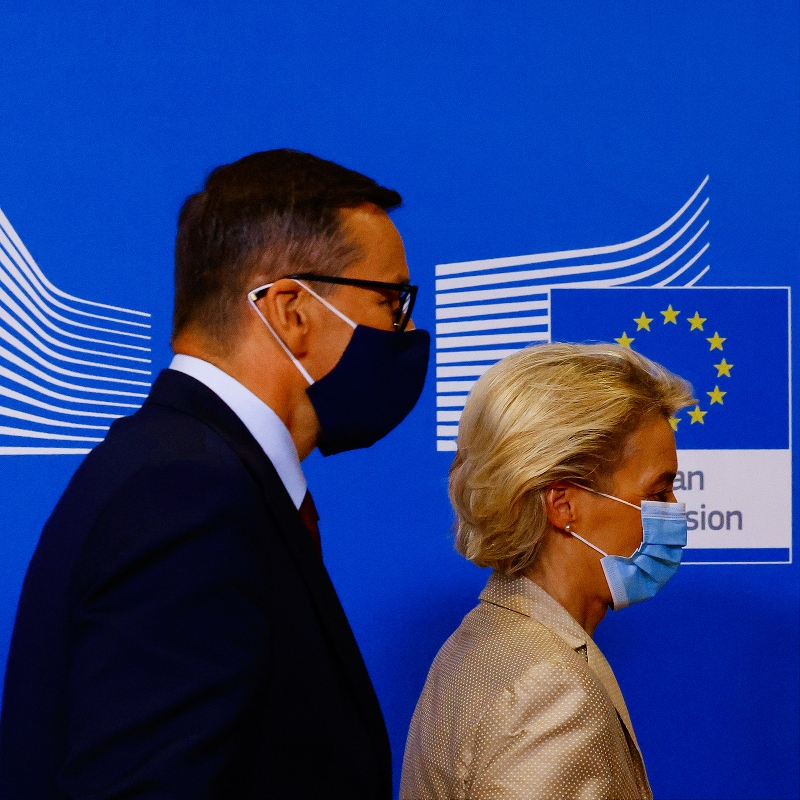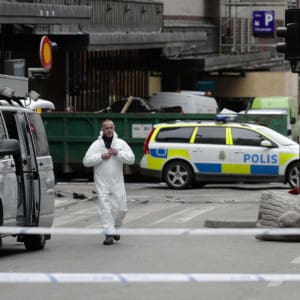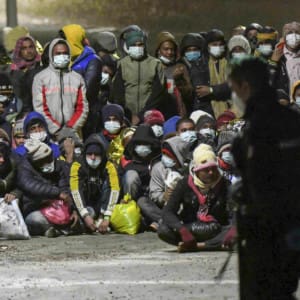Mateusz Morawiecki and Ursula von der Leyen attended their Monday evening meeting in Brussels armed to the teeth.
The Prime Minister arrived with the threat of the Constitutional Tribunal passing a ruling about the superiority of state laws over European ones, which would threaten to the destroy the EU’s construction for EU commissioner for justice Didier Reynders.
The President of the European Commission showed up with the option to withhold the EU Recovery Fund for Poland, which is the foundation of the Polish Deal economy strategy and is meant to ensure Law and Justice maintaining power after the next elections.
After two hours of talks, as the delegations’ meeting came to a close, everyone left the room apart from Morawiecki and Von der Leyen. What they told each other remains a secret.
Nevertheless, a moment later Von der Leyen wrote about a “good exchange” on Twitter and cited ecology, the Recovery Fund, and rule of law. This was confirmed by the Polish embassy to the EU – but without that last point. No one reached for their nuclear weapons.
After two hours of talks, when the delegations’ meeting was coming to a close, everyone left the room apart from Morawiecki and Von der Leyen. What they told each other remains a secret.
The difficult modus operandi between Warsaw and Brussels is beginning to take shape in this way. According to “Rzeczpospolita” information, the two sides reached an agreement concerning the details of using the Recovery Fund. Although Poland did not find itself among the dozen countries which received a green light from Brussels, this should happen soon.
In exchange, the Polish side will try to nuance the meaning of the Constitutional Tribunal’s ruling. If it declares that the Polish constitution shall prevail over European law, it will be clear that this will not influence the change to the present EU regulations in Poland. The ruling is meant to refer to areas in which Brussels does not have any competencies.
The French Conseil d’État did something similar in April concerning the storage of data. It decided that, yes, the EU has the right to care for French people’s privacy because it was entrusted with such a mission, but Paris cannot ignore ensuring security in that area because that was and is its duty.
Therefore, Warsaw wants to highlight the complexity of the agreement in which state and EU competencies will sometimes cross over. Warsaw does not want to announce open rebellion against Brussels.
This compromise should ensure rapprochement in another key area: ecology. On Wednesday, Von der Leyen presented an incredibly ambitious package for restricting the emission of harmful gases in Europe: “Fit for 55”. Negotiations between Brussels and Warsaw over this project lasted for the last 6 months. Poland is the country which most likely has the most difficulty with the EU with it comes to transforming into a low-emission economy.
The result of the negotiations was a compromise which, according to Polish decision-makers, fulfils the majority of Poland’s demands. This means that in the extended process of confirming the European Commission’s proposals which has just begun, the government will not play the role of the main breaks.
It will be much more difficult to solve the conflict over American-owned TVN. Von der Leyen is interested in this, not only in fear of blocking the free flow of capital, but also in fear of maintaining media pluralism in Poland. Here, she has a very powerful ally in Washington. This concerns the most foundational conditioning of our country: remaining in the Western, democratic civilizational sphere and maintaining an alliance with the USA. The decision to purchase Abrams tanks signals that at least the latter is important to the Polish government.
Meanwhile, the issue over rule of law which has lasted for six years is condemned to further struggle. On Wednesday, the CJEU ordered the immediate suspension of the activity of the Supreme Court’s Disciplinary Chamber. On Thursday, it will also release a ruling on the alleged “LGBT free zones.”
Western public opinion has become convinced that rule of law is threatened in Poland, and the European Parliament is pressuring Von der Leyen to deal more harshly with Warsaw. This excludes a more serious move from Brussels, and the deepening political polarization in Poland does not permit compromise. The stalemate will continue.
This all amounts not to peace, but to a ceasefire. Angela Merkel will resign in September, and she is the last Western leader who bothers to try to keep Central Europe in the EU. In April, Emmanuel Macron will fight for his uncertain re-election.
When new power has consolidated in both Berlin and France, the next round of the Polish-EU battle will begin.






